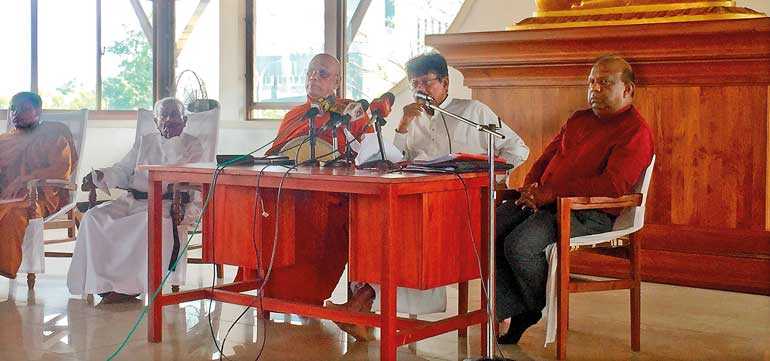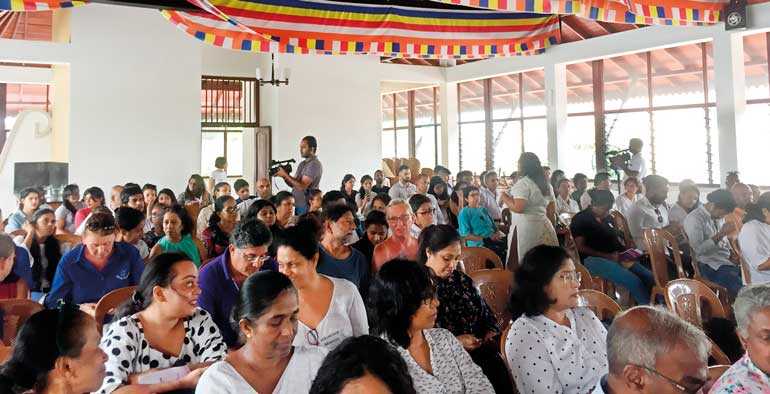Wednesday Feb 18, 2026
Wednesday Feb 18, 2026
Wednesday, 23 January 2019 00:00 - - {{hitsCtrl.values.hits}}


By Sandali Handagama
In November of 2018, a story alleging the massacre of stray dogs living on the premises of the Bandaranaike Memorial International Conference Hall (BMICH) emerged on social media. An unidentified group had arrived and begun administering vaccines that caused the dogs to “writhe in pain” and eventually “collapse in silence”. Witnesses claimed the dogs were then loaded onto a vehicle and taken away. There were doubts as to whether the dogs were merely tranquilised before removal on account of the observed pain and suffering before collapsing. Following the incident, many suspected the animals were killed by means of injected poison.
According to the Registration of Dogs ordinance of 1902, a stray dog must be seized and detained by the state for no less than two days allowing time for the animal to be claimed. If the dog is not claimed within that time, the state has the authority to “cause the dog to be destroyed or otherwise disposed of in such a manner as to the proper authority seem fit.” If the dogs at BMICH were indeed killed, it is in violation of this law because the animals were not seized and detained for the appropriate time period before they were destroyed. However, if animal activists were to then argue that killing them in an unnecessarily painful manner was an act of cruelty, the laws currently in place would not recognise it as such.
At present, the laws that apply to cases of animal welfare are included in the Cruelty to Animals Ordinance of 1907 which interprets the term “animal” to mean any domestic or captured animal. Stray animals are neither captive nor domestic. Therefore, acts of cruelty against stray animals are not punishable by law. Although the ordinance outlines the appropriate conditions for transporting animals and the treatment of animals used in labour (such as bull-drawn carts and elephants used for logging), the narrow interpretation of “animal” paves the way for loopholes that can be exploited by government, industries and private citizens to get away with acts of cruelty against animals: Cases of the inhumane treatment of livestock and of wild animals that are killed in increasingly cruel means for straying into human settlements go unaccounted for.
Even if the laws were to recognise an incident as an act of cruelty towards animals, the existing penalties for offenders are outdated. For instance, according to the ordinance of 1907, what is loosely described as the abandonment of an animal by the owner will require the offender to be punished with a fine “which may extend to one hundred rupees” or in cases that warrant imprisonment, a term “which may extend to three months.” The same fine would apply to animals that are “killed in an unnecessarily cruel manner.” At the current rate of exchange, this fine amounts to approximately $ 0.55. Both aforementioned ordinances were put in place during British rule, and are well over a century old. It is clear that there is a need for these laws to be updated, if for nothing else, to account for over 100 years of inflation.
Improving animal welfare regulations is predominantly a social and not an economic interest. Therefore, the minimum requirements for facilitating the cruelty-free existence of animals must be accomplished by creating and enforcing protective laws. For instance, in Germany, the necessary laws are incorporated into the nation’s constitution.
Acknowledging the need for a more comprehensive set of laws, compatible with modern international standards, the Law Commission of Sri Lanka drafted the new Animal Welfare Bill back in 2006. A decade later, in January 2016, the bill was approved by cabinet. Three years on, it has yet to be enacted. However, the bill has recently been receiving a considerable amount of attention. A new wave of outrage concerning the inadequate legal framework to govern issues related to animal welfare rose after images of Charlie, the pet Labrador who was immolated in his kennel by a trespasser, went viral in early January.
In a rare show of solidarity, prominent clergy and lawyers came together to call for the immediate enactment of the Animal Welfare Bill at a press conference convened by Sri Bodhiraja Foundation’s community project Justice for Animals on 13 January 2019. Joining the president of the foundation, Ven. Dr. Omalpe Sobitha Thero on a panel of speakers were: Sri Lanka Bar Association President U.R. de Silva, Rev. Abraham Ethraim Coil Raij, and Attorney Seneka Weeraratne who worked as a consultant in the drafting of the bill. A large crowd of activists representing a range of animal welfare organisations and independent supporters of the cause were also in attendance.
The unified call for the enactment of the bill comes at a critical time because it contains important amendments to the existing laws. Explaining the bill, U.R de Silva stated the most important modification to the ordinance is the change in its interpretation of the term “animal” to mean any living being other than a human including domestic animals, wildlife, strays and livestock. The specific inclusion of the terms “stray animal”, “food animal” and “wild animal” ensures animals that are not under ownership or captivity will be protected under the rule of law. The bill will pave the way for Sri Lanka to adopt the standards of international animal welfare legislation based on the “Five Animal Freedoms” set forth by Britain’s Farm Animal Welfare Council in 1979. Among other things, these freedoms require farm animals to be protected from hunger, thirst, pain, stress and discomfort due to insufficient space or improper facilities.
If enacted, the first order of the bill requires the creation of a five-person National Animal Welfare Authority to oversee the upholding of the proposed laws. The authority will also have the power to insert new laws based on future suggestions. Responding to the controversial question of imposing penalties for acts of cruelty against captive elephants including the poor conditions under which they are kept in temples, Ven. Dr. Omalpe Sobhitha Thero stated: “I am personally opposed to the use of animals for religious activities and stress that the new laws will apply to all perpetrators without discrimination.” The bill will also include amendments to penalties such as changing the outdated one-hundred-rupee fines in the ordinance to one hundred thousand rupees, and extending imprisonment of guilty parties to a term “not exceeding four years”. In his closing statement, de Silva praised the bill: “This is an opportunity to make history and show the world that Sri Lanka takes animal welfare seriously.”
On 16 January, the Court of Appeal ordered respondents including the Minister of Livestock and Animal Welfare, IGP, Director Crimes and the Director General of Wildlife Conservation to see to the immediate facilitation of the bill and submit a progress report by 1 February 2019. For animal rights activists, the wait has been a long one. But this time, they are not acting alone. By stepping out into the streets in support of the bill, Sri Lankans have proven they are ready for change. Now, all eyes are on the Parliament.